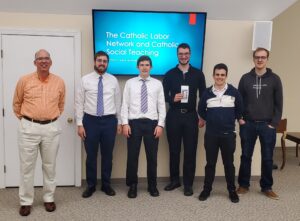Ingrid Delgado of the US Conference of Catholic Bishops was scheduled to participate in a recent panel at the AFL-CIO on the legacy of Monsignor Higgins, but contracted covid. However, she shared her prepared remarks with the Catholic Labor Network:
Thank you so much for the opportunity to be here with you today. I am honored to join you at this event to honor Monsignor Higgins’ life and legacy. It is not lost on me that it is an incredible privilege for me to have the labor portfolio and be a small part of continuing his work at the USCCB.
The importance and effectiveness of unions personally touched my life through one of my closest friends, my son’s godmother, who is a teacher. I remember her going through a really difficult time with a situation that came up at work which caused her a great deal of anxiety and many sleepless nights. But I remember her calling me, feeling very thankful and relieved after a meeting during which her union rep accompanied her and advocated for her throughout a process that ultimately resulted in her favor. Because of her positive experience, I later joined the teachers’ union myself.
The Catholic Church has a long history of calling for workers’ rights and supporting union organizing. As many of you know, Catholic Social Teaching drives the Church’s advocacy efforts and, from its beginning, from its foundation, it has been rooted in workers’ rights. Catholics recognize Pope Leo XIII’s encyclical, Rerum Novarum – or On the Condition of Labor – as the birth of Catholic Social Teaching, the first in a long and continuing series of papal documents on socio-economic problems. This letter to the Church throughout the world was published in 1891, at the height of the Industrial Revolution, and strongly reaffirmed the Church’s support of the right to organize and emphasized the need for a strong and effective labor movement. Since then and to this day, his successor popes have continued to echo this message.
Pope Francis continues this tradition of voicing strong support for organized labor. He called the right to unionize, “a fundamental right” when, in a message to the International Labour Organization last year, he said, “It is fundamental that the Church…support measures that correct unjust or incorrect situations that condition labour relations, completely subjugating them to the idea of ‘exclusion’, or violating the fundamental rights of workers.”
He compared trade unions to prophets when he stated that they are, “an expression of the prophetic profile of society.” He said, “Unions born and reborn every time that, like the biblical prophets, they give voice to those who do not have one, denouncing those who would ‘buy the poor … for a pair of sandals’ as the prophet (Amos) says, exposing the powerful who trample on the rights of the most vulnerable workers, defending the cause of foreigners, the least and the rejected.”
He said there is no good society without good unions.
And he wrote that, “people’s movements…are sowers of a new future, promoters of the change we need: to put the economy at the service of the people…”
But beyond continuing to reiterate the Catholic Church’s message of support for unionizing, Pope Francis has called Catholics to action. Just this past January, reflecting on Jesus and St. Joseph as carpenters, he said, “Today, we should ask ourselves what we can do to recover the value of work; and what contribution we can make, as the Church, so that work can be redeemed from the logic of mere profit and can be experienced as a fundamental right and duty of the person, which expresses and increases his or her dignity.”
Pope Francis regularly reminds us of the Church’s vision for a just economy that prioritizes people over profits. But, rather than speaking of it as an unattainable ideal, he has challenged us to reimagine how we can make it a reality. He has gone so far as to identify ideas from two economists, Mariana Mazzucato and Kate Raworth, as “prescient and relevant,” giving us hope that economies that work for all without leaving anyone at the periphery are no longer dismissible as idealistic or unrealistic.
Pope Francis also convoked young economists, entrepreneurs, and changemakers from around the world entrusting them to “change the current economy and give soul to the economy of tomorrow.” For two years, young professionals from the five continents have been gathering in small group dialogue as part of the Economy of Francesco – Francesco being St. Francis of Assisi, after whom Pope Francis chose his papal name. And when I say young, I mean young. I considered applying to join the culminating event in Assisi this upcoming September, and I am seriously too old. But what an exciting opportunity for the world to listen to the voices of young professionals, uplifted by the Pope, in their recommendations of how to genuinely and deeply reform the economic system.
For those of us who work at the USCCB, especially in the office of Domestic Social Development (or DSD), the Church’s support of organized labor is a significant part of our history. The National Catholic Welfare Conference, which was the USCCB’s predecessor, founded the Department on Social Action in 1919 as one of its original departments. While the name and scope changed a bit through time, it developed to what is now DSD. It is such a humble honor and privilege for us to continue Monsignor Higgins’ commitment to the rights of workers in today’s legislative context.
Our office takes the lead for the Conference on a long list of federal policy issues, including labor policy, before the three branches of government. Before the US Supreme Court, we filed an amicus brief in the Janus case in 2018. Before the legislative branch, the bishops are currently strong supporters of the Pregnant Workers Fairness Act. During infrastructure negotiations last year, the Conference called for long term job creation with a focus on adequate pay and decent working conditions, including a right to organize and resources for job training and apprenticeship programs. We encouraged members to avoid rewarding companies that engage in anti-competitive behavior and, instead, to favor various forms of employee ownership and profit sharing. We called attention to proposals such as quality and affordable childcare options, paid sick leave, and parental leave as ways to support working families.
While dignity of work might seem like only one of many issues our office monitors, there is great synthesis among all of our priorities. For example, our advocacy in favor of accessible and affordable housing and healthcare, including mental health care, greatly impacts workers. We also actively advocate in favor of strengthening child nutrition programs, consumer protection, reentry programs, the Earned Income Tax Credit, and the Child Tax Credit.
As our office takes the lead on behalf of the bishops to advocate at the federal level, State Catholic Conferences take the lead on state policy. Up until last summer, I had the privilege of working for the Florida Conference of Catholic Bishops where we were very active on state legislation regarding wage theft, immigrant justice, predatory lending, human trafficking, and farmworker conditions.
The USCCB also supports the labor movement through the Catholic Campaign for Human Development which helps fund organizations advancing community building, organizing, and worker owned cooperatives. Additionally, Catholic Charities partners with unions for job placement, job training, and have collaborated with them for food distribution efforts during COVID.
The Catholic Church and the Catholic Bishops continue to be firmly committed to workers’ rights. It has now been over 130 years since Pope Leo XIII penned the open letter to the Church that cemented the Church’s alliance with the worker movement. And as long as there continue to be economic and labor injustices, the Church and those of us who work for her will continue to walk in Monsignor Higgins’ example, supporting organized labor and working towards a just economy. We look forward to continuing to do that alongside all of you. Thank you.


